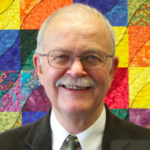While I was in worship recently, the officiant during the invitation for communion invited us as a “broken and hopeful” people to come forward to be served. As I waited for my turn, I looked at those who were in line in front of me, wondering how in their lives they had been broken and where in their lives they had found hope. This helped me to feel closer to them and made the sacrament a more intimate experience than I had ever known it to be. We were all one in our shared humanity and in our desire for God’s grace.
For people living with mental illness, social stigma prevents us from finding this sense of unity, leaving us isolated and alone. It causes us to hide our brokenness from others, even from those who love us the most. It keeps us from asking for help when help is so available. It is also self-reinforcing in that the more we keep quiet the more we reinforce the utterly false belief that we have something to hide and are somehow to blame for our illness.
Worst of all, stigma makes us ashamed of our own stories. Yet it is just the sharing of our stories, our own experiences of what mental illness has broken in our lives, that gives us hope. It is the heart of recovery. Moreover, this giving of hope doesn’t stop with us, it splashes on those around us. I know this from experience. When I tell my story of illness and recovery, I benefit, but so do the people living with mental illness who are listening to me. It’s simple: if I can get better, then recovery is possible and there’s hope that they can get better as well.
At the communion service, I could only guess at what it was – a physical or mental illness, a major disappointment, a loss of something precious – that brought brokenness into the lives of those around me. Still I was sure that if we had some time together, time to share our stories, we would have bonded through compassion for one another.
As we moved forward to receive the sacrament, we were united by more than the hardships in our lives. We also shared the hope that our need would be met by God’s love. We were trusting that compassion is not only a human attribute, but that a compassionate God would look upon us and would not turn away. The invitation to communion had assured us that we are acceptable in the sight of God and welcome guests at the sacrament. For a person living with mental illness, God’s acceptance brings healing to our shame and self-rejection, making it OK to be open about who we are. Stigma has no place at the communion table.
As a pastor, I’ve used a lot of different communion liturgies over the years. The next time I officiate, whatever else I say, I’m going to end by inviting the “broken and hopeful” forward. I hope that the words will be as healing for them as they were for me.

Bob Griggs
Ordained in 1973, Bob Griggs has served UCC churches in Massachusetts, New Hampshire, and Minnesota. He is an Advisory Council member at Vail Place, a club house for people living with mental illness. He is also the author of A Pelican of the Wilderness: Depression, Psalms, Ministry, and Movies and Recovering from Depression: Forty-Nine Helps.
